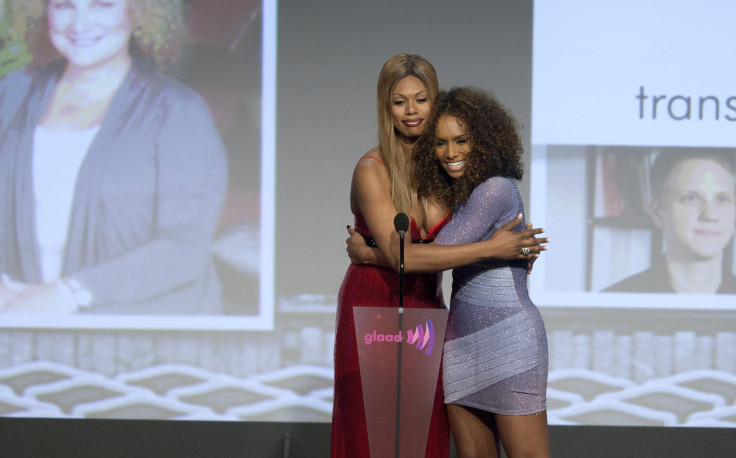TERF Wars: 'Radical Feminists' Are Going After Transgender Activists, But Why?

Transgender activists and feminists who do not recognize trans women as women are squaring off on college campuses and online. And the hashtag that crystallizes the debate -- #TERFs (trans exclusionary radical feminists), a pejorative term used to describe these anti-trans feminists -- is trending on Twitter. This raises the question: Why are 1970s-era anti-porn, anti-sex work, anti-trans feminists whom many would consider retro -- even reactionary -- hitting back now?
The most recent Twitter surge erupted with an open letter published Sunday in the Guardian of London and its sister publication, the Observer. The piece, which argued that people who expressed sentiments deemed “transphobic” were being censored on college campuses in England, ignited debate on social media, debate that goes well beyond what such ideas mean for free speech on campus.
The letter exposed an animosity most people outside of certain academic and activist communities might not have known about, between transgender activists and a certain faction of feminists who who believe transgender women are not “real women” and should therefore be excluded from feminist events and even female bathrooms. Some are even "doxxing" trans teens, exposing their identities online.
*rage* RT @natachakennedy: #TERFs admit online "monitoring" of #trans boys https://t.co/B2TUsN1AiA
- Fred McConnell (@fred_dash) February 17, 2015TERFs even have an Urban Dictionary definition, defined there as a "group of feminists that claims that trans women aren't really women, as biological determinism is only a fallacy when it used against them, not when they use it against others." A trans blogger writing at Inchoaterica described TERFs as those who are “doing the patriarchy’s work and calling it feminism" and they've even been called "the Westboro Baptist Church of feminism," referring to the notorious hate group that protests at funerals of gay and transgender people.
Among the most vociferous anti-trans feminists is 1970s feminist icon Germaine Greer, now 76, author of “The Female Eunuch.” Greer has said transgender women are “a ghastly parody,” that they are merely men with “delusions,” exercising their male privilege to infiltrate the feminist movement, and that trans women do not know what it is to "have a big, hairy, smelly vagina," which Greer apparently considers a prerequisite to calling oneself a woman.
This kind of talk has been deemed transphobic hate speech by some -- as well as a throwback to “essentialist” notions about sex, notions that have been called into question since at least the 1990s, when a number of academics shifted the debate from sex to gender and its social construction. Gender theorists such as Judith Butler, UC Berkeley comparative literature professor and author of the groundbreaking book "Gender Trouble," argue that a transgender person’s gender dysphoria helps to expose the way all gender identities are dysphoric; that none of us inhabits “femininity” or “masculinity” as comfortably as we think we do; and that it’s our “performance” as men and women that maintains those categories, rather than some biological truth of sex. Some consider such ideas a truer manifestation of radical feminism, as they offer a way of rethinking what it means to be men and women outside of biological notions of sex.
Feminism, the TERF argument seems to be, is a club that only women who’ve suffered sexism can belong to. More contemporary feminist theorists would argue that this is a narrow and old-fashioned way of looking at feminism, ignoring not only the discrimination transgender men and women experience, but also the potential liberation for everyone, cisgendered or transgendered, which lies in analyzing the category of gender itself, rather than drawing rigid lines around what defines a man or woman.
Ultimately, the return of the second-wave feminist trying to silence and exclude transgender women could be as simple as an attempt by some formerly central feminists to regain their rhetorical turf. In a recent post on TERFs, blogger Feminist Killjoy writes that these kinds of turf wars are familiar. "When lesbians demanded entry into feminist spaces, we were called a 'lavender menace,' " she wrote. "We got in the way of the project of making feminism more acceptable. When black women and women of color spoke of racism in feminism, we were heard, we are heard, as angry, mean and spiteful, as hurting white women’s feelings."
It would seem that TERFs have not changed much in their thinking about trans women encroaching upon "their" feminist territory since 1973, when radical feminist Robin Morgan protested the appearance of a trans folksinger at a feminist gathering:
"I will not call a male 'she'," she said. "[T]hirty-two years of suffering in this androcentric society, and of surviving, have earned me the title 'woman'... he dares to think he understands our pain? No, in our mothers’ names and in our own, we must not call him sister."
© Copyright IBTimes 2024. All rights reserved.






















